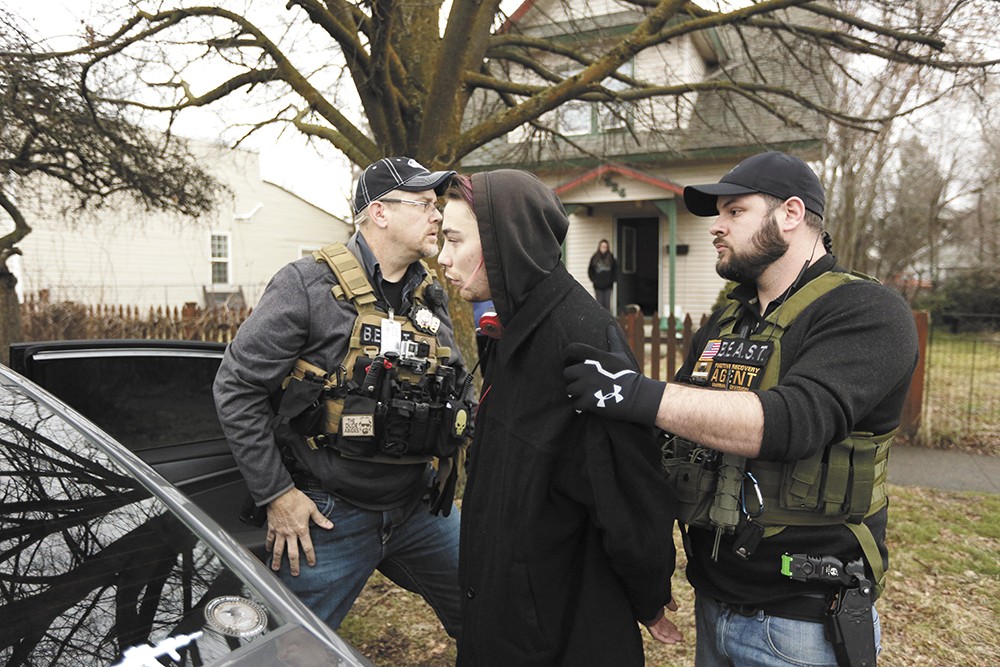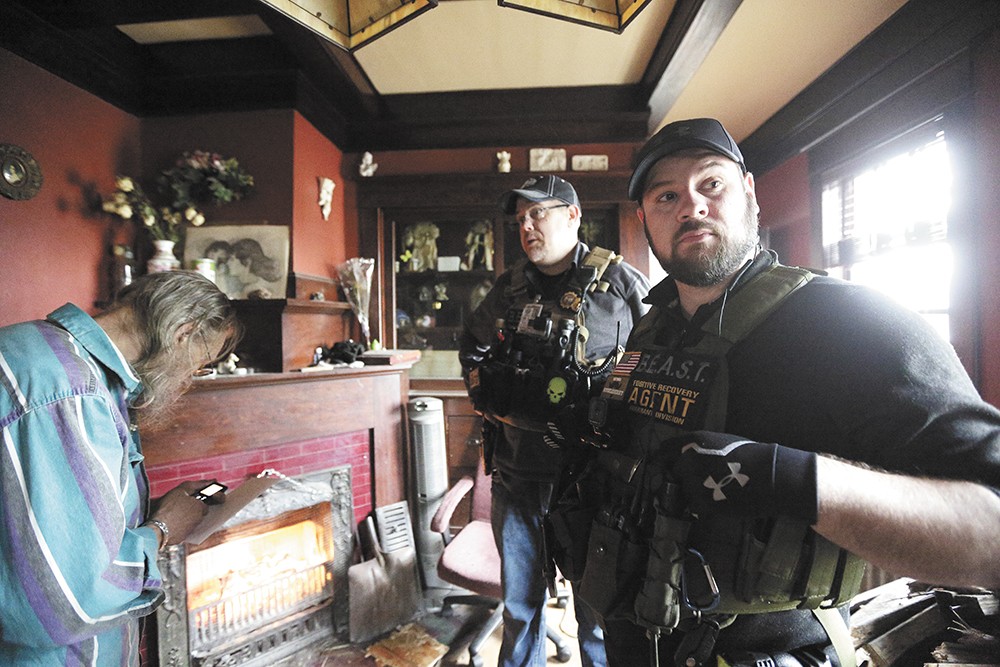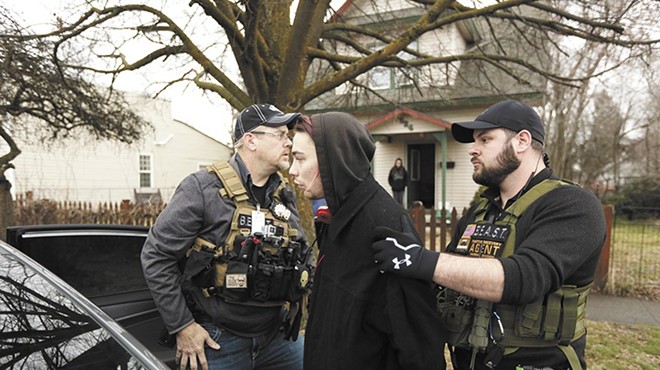
T hese two are prepared for all manner of shit that may come their way. Hanging from their bulletproof vests are handcuffs, expandable batons, Tasers, gloves, flashlights and GoPro cameras. One wears a patch on his vest that says "The Dude Abides." An insignia on the other's chest declares "I'm Your Huckleberry." Handguns hang on their hips; in the trunk is their backup: high-powered rifles capable of cutting down a man from 300 yards.
They're not cops, but they're here to make sure fugitives keep their promise to show up for court. In the driver's seat is Scott Gribble, a former border patrol agent with a trim, graying goatee. Next to him is his partner, Steve Krause, formerly in the Navy.
They're modern bounty hunters, and they're looking to get paid.
"The only reason to do this job is for the money," says Gribble, who made over $100,000 last year. "If you're in this to clean up the streets and make the world a better place, you're disillusioned."
Should they run into any problems during their manhunt, Gribble carries a copy of a U.S. Supreme Court case from 1872 that says, in essence, they can go wherever they need to in pursuit of a wanted fugitive. Because they aren't cops or "state actors," they're not bound by the constitutional rules protecting due process and prohibiting illegal searches and seizures.
Today, they're in a parking lot across from a quiet residential neighborhood, watching a wanted fugitive's mother's house. Krause thumbs through Facebook on his phone, looking for leads. Nothing online, and no activity at the house.
Krause moves down to the next name on their wanted list, a man they've linked to a local prostitute. They're going after his weak spot.
"Call your hooker," Gribble barks to Krause, who phones the woman and arranges a meeting. And just like that, their trap is set.
Bail enforcement agents, as many prefer to be called, chase people who missed court dates after posting bond to get out of jail. They catch a bad rap in part because of pop-culture depictions like the reality TV show Dog the Bounty Hunter, and because of hotshots who think they can do the job but have little or no experience.
Gribble is trying to change that "knuckle-dragger" persona. He teaches a bounty hunter boot camp that meets the state's training requirements, where he tries to instill a sense of professionalism to the job.
"My philosophy is I treat everybody the way I would wanna be treated," he says. "If I'm an asshole, treat me like an asshole. But everyone is innocent until proven guilty, and everyone deserves their day in court. We help them keep that promise."
Still, bail enforcement agents — and the hazy rules under which they operate — are not above criticism.
"The system — where [bounty hunters] put themselves at risk and trap offenders who can resort to violence to get out of that situation — is flawed," says former Ada (Idaho) County Sheriff Gary Raney. "They don't all necessarily have a sense of really understanding what the law says about how much force they can use, and the legal and moral sense of what it means to take a life. Law enforcement is better equipped to do that."

'MAY BREAK AND ENTER'
The commercial bail bond system is ancient. Its origin is often traced to English common law when, before state-sanctioned law enforcement, citizens would chase after fugitives, says Brian Johnson, a criminal justice professor at Michigan's Grand Valley State University who studies the industry.
With the exception of a handful of states, the modern businesses still follow the same principles: You pay a bond company a percentage of your court-imposed bail. The company promises to make sure you show up to court. If you don't, they're on the hook for the rest of your bail unless they can find you.
That's where bounty hunters come in. That Supreme Court case from 1872 remains the authority on what they're allowed to do.
"They may pursue [a fugitive] into another State; arrest him on the Sabbath, and, if necessary, may break and enter into his house for that purpose. The seizure is not made by virtue of due process. None is needed," the opinion reads.
Not until the 1960s did a system that requires money in exchange for pretrial freedom begin drawing criticism for its inherent discrimination against poor people. The Vera Foundation's (now the Vera Institute of Justice) Manhattan Bail Project in 1961 and the National Conference on Bail and Criminal Justice in 1964 led up to the federal Bail Reform Act of 1966, which in part put restrictions on money bail bonds, but did nothing to rein in the people who hunt those who skip out on bail.
"I submit that the commercial bail bond companies have a greater influence on who stays in jail, and who gets out, than judges do," Raney says. "We need to change that."
In 1971, Supreme Court Justice Harry Blackmun called the abuse in the commercial bail system "offensive" and "odorous," and in 1974, Oregon abolished commercial bail bonds altogether. Wisconsin followed suit in 1979. Illinois and Kentucky also have abolished for-profit bail. In those states, the court generally takes the place of commercial bondsmen. Robust pretrial monitoring programs also play a huge role in allowing judges to decide between detention and release.
Although case law has chipped away at the 1872 decision, Taylor v. Taintor, its authority largely remains intact. Congress tried to regulate the industry in 1999 with the Bounty Hunter Responsibility Act, but those efforts failed. As recently as 2009, a U.S. Court of Appeals reinforced bounty hunters' exemption from constitutional protections against "state actors."
It wasn't until 2006 that Washington state began requiring licenses to hunt fugitives. In fact, state law specifically references the Supreme Court case by name: "The legislature does not intend... to restrict or limit in any way the powers of bail bond agents as recognized in and derived from the United States Supreme Court case of Taylor v. Taintor."
If you ask the local criminal justice players — judges, attorneys, law enforcement — they'll tell you they don't know much about bounty hunters and the rules they play by.
That's because there are some gray areas, especially surrounding bounty hunters' relationships with police.
One recent example landed a former Spokane police officer on unpaid leave and left a former unlicensed bounty hunter facing criminal charges.
Dennis Kariores, who now lives in Florida, says he was friends with several Spokane cops who would call when they needed help getting around those annoying constitutional rights.
"Those were some of the craziest years of my life," Kariores tells the Inlander. "As a bounty hunter, I had so many informants. There were several times where I had relationships with people the cops were looking for. They'd say, 'Hey, go get this guy and run a red light, and we'll pull you over.'"
Former Spokane police Officer Alan Edwards was suspended for two weeks without pay in 2011 after an internal investigation determined he violated department policy by concocting a "ruse" to illegally enter a Spokane home with Kariores' help. Edwards, Kariores and another bondsman planned to take a man Kariores had captured to a home where Edwards believed some stolen Cadillac rims were being kept.
When the fugitive ran inside, Kariores chased him, which allowed Edwards to follow them inside without a search warrant. (Edwards was later fired for a separate incident.)
For Spokane County Superior Court Judge Annette Plese, bail enforcement agents are a "necessary evil."
"I think we get more cases brought back quicker because the [bond companies] are going to lose money if they don't bring them back here," she says. "They allow us to resolve the warrant so it doesn't just languish in the system for years."
'HOUSE OF RECORD'
The men's thick black boots squish the soft earth around the home they've been watching for the past 30 minutes. Krause sprints through the backyard to the back door. Gribble walks calmly to the front and knocks.
"Washington state bail enforcement!" he says, flipping through the thin manila folder. No one answers. Krause radios that the back door is unlocked. He opens the front door for Gribble.
The two-story house in north Spokane is the address that William Berg, who is out on bond for a misdemeanor charge, put on his contract with the bond company. In the bail bond world, that's known as "house of record," and it means that bail recovery agents can walk in anytime without permission. Had the back door not been unlocked, legally they could have kicked the door down, but Gribble says he wouldn't have.
"If we have to, yeah, but everybody's got this mentality that we're kickin' doors all the time, and that's just not what we do," he says.
They start searching upstairs: in each bedroom, under the beds, the bathrooms, the closets. Then they move downstairs. No one is home.
Gribble calls local police dispatch to let them know they've entered the house as a safety precaution. As they walk out the door, Berg's 17-year-old sister is just getting home from school. She hasn't seen her brother in months, and he rarely comes to the house. Gribble asks her to message her brother on Facebook. Soon, Berg is on his way to the house. Krause goes out to the car to wait. Gribble takes a seat on the couch in the living room and chats with Berg's sister.
Minutes later, Berg walks through the door. Gribble arrests him without a problem. His sister gives him a hug before they leave.
"I apologize for bringing this shit to your mom's house," Gribble says to him.
"It's all good," he says. "I brought this on myself."
"So why'd you miss court?" Krause asks after loading Berg into the car.
"I just ended up oversleeping," Berg says.
They have to take him to the courthouse for paperwork before dropping him at the jail. Krause offers Berg a cigarette while they wait.
"If they're cool," Gribble says, "we're cool."
But they're not always cool.
ON THE WRONG SIDE
Last year, Christopher Schulthies, a 30-something bounty hunter from Idaho Falls, shot and killed Philip Clay, a fugitive he was chasing. Schulthies, whose training was as a nightclub bouncer, reportedly told Clay to drop his handgun multiple times before he fired five shots, killing him. Bonneville County prosecutors decided not to charge Schulthies in the death, saying that earlier in the day, Clay had pointed a loaded gun at other bounty hunters chasing him.
But lawmakers in Idaho are now drafting a bill that would require bail enforcement agents to distinguish themselves from law enforcement in appearance, in part, by not wearing badges.
Unlike Washington state, where bail recovery agents have to be licensed by the Department of Licensing, Idaho has no such restrictions. The only requirement to be hired as a bounty hunter in Idaho is state residency.
"You can be a convicted felon and be a bounty hunter in Idaho," says Raney, the former Ada County sheriff. "There are no regulations in Idaho, and that's the case with many states."
Despite stiffer licensing requirements, some Washington state bounty hunters have still found themselves on the wrong side of the law. Jason Stomps, for one, is serving a 15-year sentence in state prison after forcing his way into a house in Vancouver, Washington.
On the evening of March 20, 2014, Stomps and his partner said they saw Courtney Barnes, who was wanted for felony warrants, inside a split-level house. The three people inside refused to open the door, so Stomps broke it down using an antique railroad-spike hammer.
When the police arrived, Stomps was standing in the doorway, his gun drawn. Two of the people in the house were handcuffed together because "they weren't listening to us," Stomps told authorities, according to court documents. Police arrested him before he had a chance to search the house.
"We thought the guy was in the house, and in the state of Washington, that means we can go in," Stomps tells the Inlander from the Monroe Correctional Complex.
Stomps had the contract Barnes signed with the bond company listing the address as the "house of record," and he says he had "reasonable cause" to believe Barnes was in the house.
Dan Gasperino, the Clark County deputy prosecutor who handled Stomps' trial, says the "reasonable cause" standard is not as well defined as, say, the probable cause standard that police must abide by.
"I don't know if there's really a definition for it," he says. "A reasonable person gets to determine that, which would be the 12 jurors."
Stomps was charged with kidnapping, assault and burglary. He was offered a plea deal for nine months of work release, but turned it down. Stomps says he spent 12 years in the military, some of those as military police.
"They wanted my gun rights, and I told them to get f---ed," he says. "I didn't commit a crime. I was obeying the law the best that I could. There's a lot of gray areas in the law."
He believed that if he testified at trial, the jury would see he didn't intend to commit a crime. If convicted, he was looking at nearly 20 years in prison, but Gasperino recommended an exceptionally lower sentence of 12 months. Clark County Judge Derek Vanderwood agreed and sentenced Stomps to one year, but mandatory firearm enhancements tacked on another 14. "One for every bullet I had in my gun," Stomps says.
THE LIAISON
It's 7 pm now. This is the time Krause arranged to meet the prostitute at a hotel along Division Street. Kellen Jaeb, a fugitive they've been chasing for two weeks, is known to date her, and they're banking on Jaeb driving her to the fake meet-up.
Krause waits in the hotel lobby while Gribble sits in the car.
A dark Dodge Charger rolls by.
"We were told they might be in a Charger," Gribble announces. He puts the car in gear but doesn't turn his headlights on. As he approaches the car, a young blonde woman comes into view, and Gribble pulls right in front of their car.
"Hands in the air! Put your f---ing hands out the window!" he yells, gun drawn, approaching the fugitive's car. "What's your name?"
"Johnny Walker," Jaeb says.
"Johnny Walker, huh?" Gribble says, cuffing Jaeb's hands. He pats him down against the car.
"Got anything on you that you don't want to go to jail with?" he asks. "Get rid of any drugs or anything, or they'll stick you with more charges."
Jaeb, who has a wad of cash in his front pocket, says to give it to his girlfriend.
"OK, hang on. You understand that 90 percent of the time when guys give money to the girls when they go to jail, they never see that money again," Gribble tells him quietly. "You need to think about that."
"I know, I seen it before," Jaeb says, turning to the sobbing woman. "Baby, calm down. It's way better than the police catchin' me, for real."
Outside of the Spokane County Jail, Krause lights up a cigarette for Jaeb, whose hands are still cuffed behind his back. Jaeb spent some time at Coyote Ridge Corrections Center while Krause was a corrections officer there. They swap stories before a jail guard takes Jaeb in for booking.
"Good luck to ya," Gribble says. Jaeb is the second fugitive they caught today, and another turned himself in. They'll get paid for all three.
"That's a $1,300 day for us," he says. "Not bad."♦





















